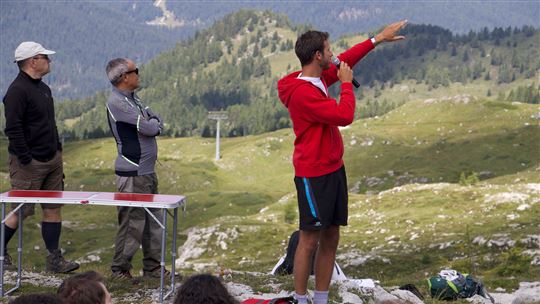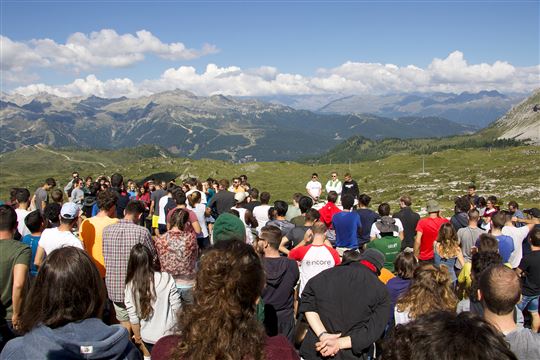
University students. The possibility of a “life that is more Life”
The leaders of the CLU met with Julián Carrón in Madonna di Campiglio, Northern Italy. The interventions, the dialogues, the testimony of Fr. Sergio della Cascinazza. A rediscovery of what attracts the whole person."The most important thing I have ever said in my life is that God, the Mystery, has revealed Himself, communicated Himself to men in such a way as to make Himself the object of their experience.” Fr. Carrón re-emphasised this, first brought into focus more than twenty years ago by Fr. Giussani, in his conclusion to the three days spent at Madonna di Campiglio, with the leaders of the university communities from Italy and abroad. The meetings, dialogues and testimonies of these days of late August all gravitated around this central point.
The common thread that was picked up again in the conclusion evolved from the first intervention from the opening assembly. “During the Clu summer holiday”, recounted Matteo, “I was taken aback by the games. A joy was evident in the face of those who were taking part: even a friend, who has long lived in objection to everything, had a face that still today I cannot explain”. There is something irreducible about this exceptionality, so much so that once the diversity, the fullness of those faces, has been recognised, every attempt at explanation seems insufficient. What generates such joy? How can we explain those faces? “The perfection of an organization or the enthusiasm of the moment are not enough to account for the experience of total correspondence I have here," concluded Matteo.
From here, after seeing these friends, the path to truth begins. In fact- as Carrón reiterated- without the experience of an encounter that transforms the face, that makes life truly Life, faith remains abstract, a completely impossible phenomenon. What makes Christianity current, credible and compelling is the possibility of meeting a man so engaged with the meaning he announces, that he bears its signs upon his face and in his gaze. Since the time of Zacchaeus, truth has manifested itself to man from within an unparalleled experience of fullness: this is the same event that still happens today. Juan testified this by recounting an event that occurred during the Clu holiday in Spain. A Moroccan girl, who was invited for the first time, immediately after the introduction to the holiday, confessed to him: “I am sad because when I am with you many painful things in my life resurface, that I would prefer to hide. But since I met the movement I have begun to reflect on them, because here you look at me in a way that I have never been looked at before”. The novelty of life is transformed into a gaze. "Christianity", asserted Carrón, "is either this event or a fact of the past". And it is precisely those who most urgently sense their fragility and their limits who immediately notice the signs of an exceptionality: because no other prerequisite is necessary to recognize what is true, other than an authentic awareness of one's own humanity, a profound sense of one's own need for affection. In fact, only a presence that is of the same grandeur as this drama can be interesting for man. In front of her friends of the Clu, the Moroccan girl has perceived something that is capable of satisfying the "affective void" that everyone feels within themselves. Suddenly, all of her affection was enticed by those people. This is the method by which the Mystery has chosen to reveal Himself: from the beginning, and still today, He makes Himself present within an experience of exaltation and fulfilment of life. "We know that it is Him," said Carrón, "because affection finds an answer. Without this experience of attraction, it is not possible to be Christian, and it is this experience that gives reason to our faith".
And the possibility for a "life that is more Life" was demonstrated by the testimonies. One evening, Francesco spoke about a semester he spent in Tübingen, whilst on Erasmus: from his journey on Flixbus, to living with flatmates that were very removed from him in terms of their culture and sensitivity, from meeting people from the German community, to the possibility of a different gaze upon himself and his own limits, the months spent abroad, in everyday life, were studded with exceptional events, with gifts. The apparent solitude was constantly interrupted by the beckoning, discreet but at the same time dense, of a Presence that always surprises.
Giacomo also recounted the events of a summer spent in Munich, where he went to learn German. After the first few days, which he lived in a defensive manner, not leaving any room to the unexpected, he found himself open, involved in the relationships with his peers that he did not yet know well. When the time came for him to return to Italy, his teacher said goodbye to him in this way: “I’m sorry that you have to leave. We need people like you in class. Presence is enough.” What happened in order to produce such a shift in others? What was introduced so that strangers suddenly noticed him? The friendship that arose was not the result of a strategy or a capacity, but "presence was enough". Giacomo immediately sensed a link between this possibility of a relationship with the students in his class and the encounter with the students of the Clu in Munich. "Even though I didn't understand what they were saying, I would never have left: their faces spoke to me. I realized that I had the same question towards them that the students in my class had for me". An encounter with people with changed faces had undermined his initial closure and had imprinted a new trait also upon his face. Thus, without the need to add or clarify anything, his presence heralded, for everyone around him, the possibility of an interesting diversity.
The last intervention of the closing assembly recalled Matteo's first story. Luigi described the contrast between a summer of hard work and the days of this meeting with Carrón: despite all the discouragement and the feeling of disappointment that followed him, nothing could have prevented a hope from resurfacing within him. In the instant that he saw his friends playing the games, their faces changed, a desire had arisen in him: the desire to be like them, the desire to have that face. The reaction was so great that it triggered the question that the same exceptionality that had penetrated the lives of those people could also conquer him totally. "There you go", replied Carrón, "Christianity is this: to find yourself before someone who seizes your life completely. It's such a concise event that you end up wishing that face for yourself”.
After all, it's the same intuition that Father Sergio, prior of the Benedictine monastery of Cascinazza, mentioned in his testimony. Truth shows itself through an experience of fullness that, through its attraction, draws everything to itself, and the more man adheres to the proposal, the more the proposal itself is transfigured and conquers the person who adheres to it. The abbot said it in using an expression of Fr. Giussani: "This is the rule that defined the daily task of those who were “called”: (...), to make ourselves "you", just as He became ours, (...) He became you, because by calling you He became you".
#CLU